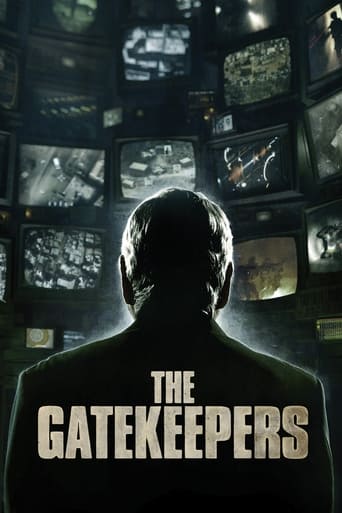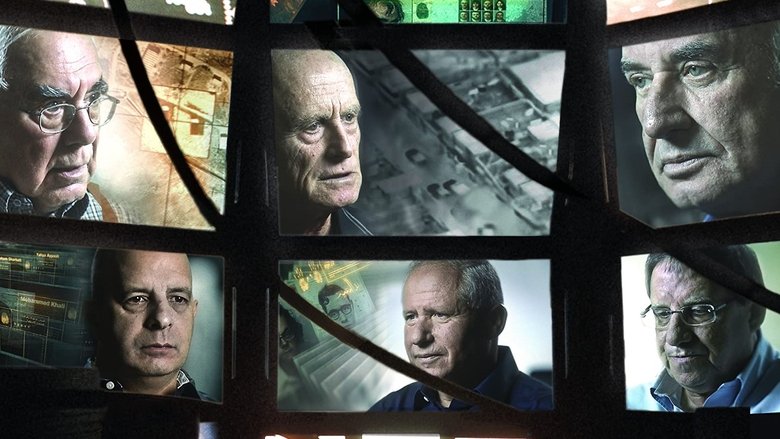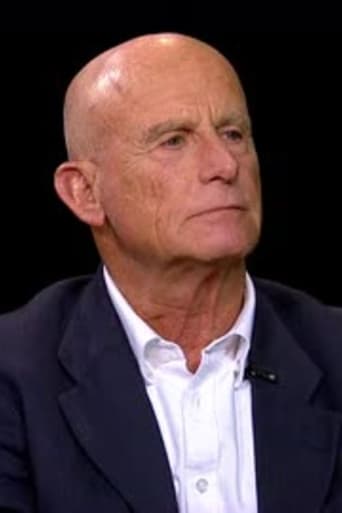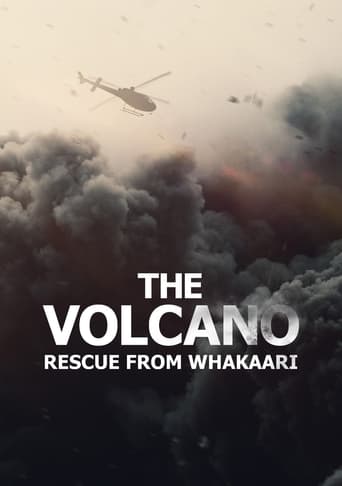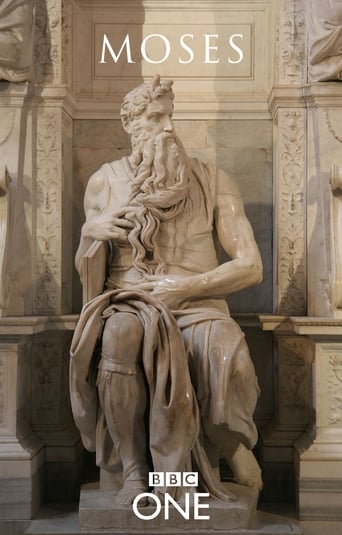The Gatekeepers (2013)
In an unprecedented and candid series of interviews, six former heads of the Shin Bet — Israel's intelligence and security agency — speak about their role in Israel's decades-long counterterrorism campaign, discussing their controversial methods and whether the ends ultimately justify the means. (TIFF)
Watch Trailer
Cast


Similar titles
Reviews
Israeli cinematographer and director Dror Moreh's documentary feature which he co-produced, premiered at the Jerusalem Film Festival in 2012, was shot on locations in Israel and is an Israel-France-Belgium-Germany co-production which was produced by producers Estelle Fialon and Philippe Kowasky. It tells the story about six former heads of the Israeli secret intelligence agency governed by Israel's president called Shin Bet which was founded in the late 1940s, who are assigned to defend their nation against terrorism, espionage and the release of state secrets. Distinctly and precisely directed by Israeli filmmaker Dror Moreh, this finely paced documentary feature which is narrated interchangeably from the interviewees' viewpoints, draws an exploring and densely informative portrayal of the ongoing Israel-Palestine conflict and of some of the men who were and still is involved in it. While notable for its reverent cinematography by cinematographer Avner Shahat and production design by production designer Doron Koren, this narrative-driven story about foreign policy and contrary ideologies where the significantly educated and experienced men in question elaborate on their role within their private organization, their recruitment of agents, their communication with and interrogation of terrorists who regard them as terrorists, their relation with Palestine and with the Knesset and former presidents and prime ministers, their views on their nation's political history and their tactical methods, becomes a rarely interactive negotiation of power between the interviewees who usually are the interviewers and the interviewer which leads to objective conversations regarding what Palestine has done to Israel and vice-versa, presents a democratic approach which contradicts the anarchistic history it examines and the Israel-Palestine situation and leaves the still crucial questions regarding the possibility of breaking the bloodline of vengeance, of a balance of power, of a lasting armistice and how to communicate humanity were tactics rule, and contains a great and timely instrumental score. This somewhat philosophical, tangible and sarcastically humorous documentary feature which is set in Israel in the 21st century, which plays on imagination, intimidation and authority, which reflects on the history of Israel and the history of their conflict with Palestine from the Six-Day War in 1967 and where men talk about their highly confidential work for the first time, is impelled and reinforced by its fragmented narrative structure, subtle continuity, reenactments, archival footage, distinct psychological atmosphere and interviews. A cinematically commendable study of history.
In 2010, Shireen was stopped at a checkpoint in Jerusalem and asked for her ID."I gave the Israeli soldier my ID. He said that I couldn't pass and have to take a detour. I asked for directions. He screamed suddenly and told me I was under arrest for three hours. They put me inside a small room near the checkpoint with large windows. Later a jeep came and they transferred me to a Jabal al-Mukaber police station. Someone identified himself as an officer. He didn't mention his name. No charges were mentioned. Only that I'll be transferred to Talpiot police station.In Talpiot they interrogated me and accused me of owning a knife, which I didn't. I was under arrest for 24 hours and would be transferred to Maskobiyeh Detention Center. They handcuffed and blindfolded me. Later on, I realised I was in an interrogation room. They removed the blindfold. An interrogator said: 'Welcome, we've been expecting you for a long time.' They confined me in a cell. Soldiers came later and told me I'm going to court which was comforting. I knew if I meet a judge I will be released. I did nothing wrong. They took me blindfolded through long corridors. I heard Palestinian detainees calling upon me to remain strong. I was confused. What do they mean? Was I not leaving?I was alone in the cell, which I believe was underground. I had to go down a very long staircase to reach it. It was very small to fit a person. It had a pit-toilet and a sleeping mat. The smell was horrible. The walls were grey and made out of pointed stones. I hurt myself several times trying to support my back or head. The orange lights were kept lit all day. The AC was mostly on with full power. I felt like I was in a fridge. My whole body turned blue from the excess chill. The iron door had a small slot they used to talk to me. They switched me between two cells. I knew that because the door location changed. Sometimes they'd get me to a new cell with the lights off. I couldn't even see my own hand there. So, when I approached the door or the pit-toilet, I end up hitting the wall. Only then did I know they switched the cell. They made my meetings with the lawyer difficult. They'd make him wait for hours falsely claiming I'm being interrogated. Other times they claimed I refused to meet him without informing me. They left me alone while the lawyer was waiting elsewhere. They'd intentionally sit very close to me. They almost stick their mouth to my ear and shout loud. One day the interrogator unchained me and approached. His face was almost glued to mine. I asked him to give me my space. But he told me: 'We're the ones who decide here. You have no personal space. Who do you think you are?'I pushed him away. Other interrogators rushed in and started shouting. They hit me, tied my hands and legs and blindfolded me, repeatedly dragging me on the floor and slamming me against the wall. They chained me with a leash and said: 'I dealt with the likes of you before. You're rubbish. You're worthless.'During interrogation I asked for a Quran, a book, a pen. Anything to feel alive. I said I'm on strike until I get my demands. When I finally got the chance to buy a pen, I was so happy. I felt like a kid on New Year. I started to write down everything I experienced. I wrote about finally buying a shampoo to use in my cell. I described to my mum the scarce smell of hygiene. Being a girl in the interrogation, they know honour and reputation is something we highly value. So, they use it against us. They threatened to rape me. A colonel once came to me in the later stages and called me nasty names. He gave details on sexual positions, and that he'd bring his dog to do those things to me. As if to say we are worthless, not human. That we're worthy of dogs.The detention with all its horrors had a positive side. It allowed me to experience things that detainees may hide. If I go back to being a lawyer or working with children, the cases won't be rumours I merely hear about. I lived through it."
A very brutally honest documentary about the conflict in Palestine. Ex-chiefs of Israeli intelligence, Shin Bet, come out openly about their operations in the occupied Palestinian territories. Interestingly, these top Israeli security officials openly accept the reality of how Israel has been brutally occupying the Palestinian people for decades. Moreover, they talk about their decisions which led to the killings of numerous innocent people. They talk about how Israel dropped a one-ton bomb in the middle of crowded housing area, which resulted in many innocent deaths and 14 children under the age of 15 were burnt alive.Lastly, these officials also accept that the responsibility of not having peace in the region lies on extremist elements within the Israeli state that do not want any peaceful settlement of the conflict.All in all, it is amazing to see that these top security officials come out in open and talk about all the things in such honest manner.In the end, they wish that a settlement to the conflict is reached and Palestinians are given their due rights--but they remain cynical. One of the former heads of Shin Bet says in the end "Israel acts like German occupation forces acted during World War 2. It is heartbreaking to see, but it is the reality"
This documentary has almost nothing to do with the intricate details of the decades-long Israel/Palestine conflict. It makes almost no attempt at summarizing the history of the conflict. Being an American with a passing knowledge of the conflict, I had some idea of the events being talked about, but I lacked any sort of concrete internal time line of the conflict or anything of that nature.But that's not the point of this documentary. The various events and tragedies of the conflict are used as conversation points to elicit from the former heads of Shin Bet their moral, ethical, and emotional viewpoints on war and anti-terrorism. The viewer gets to see, first hand, the personal struggles that go on inside the minds of men charged with a nearly impossible task: eradicating terrorism while attempting not to become terrorists themselves.We see that certain interviewees struggled to no end with the morality behind killing captured terrorists, collateral damage, and military operations that may or may not have been legal under military law. One interviewee appears to operate under the assumption that killing terrorists is always justified, whereas another takes a step back and acknowledges that one man's freedom fighter is another man's terrorist.If these types of thorny issues discussed on a personal, sometimes emotional, level do not interest you, then this film is not for you. If you are looking for a war documentary, this is not for you. If you are looking for politicized documentary, this is not for you.This is a long series of interviews with Shin Bet decision-makers, punctuated only by brief explanations of the events upon which the interviewees are questioned. The viewer sees elements of compassion, struggle, helplessness and even sociopathy in the responses elicited.Most of all, these men are all human, discussing their actions and decisions on a human level. Their final conclusions act as a fitting conclusion to the film. Even if you hate these men, or disagree with what they have to say, this film is the essence of well-made documentary.*As a side note, some will argue that this film displays a pro-Israeli stance. However, any film which interviews the commanders of a certain armed force will inevitably present that side's viewpoint. This documentary is not sold as anything but what is -- interviews with the men in charge of Shin Bet.

